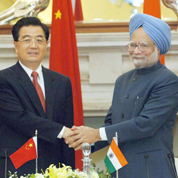The end of the crisis year that changes the world forever

Indeed, it seems that almost everything that could hypothetically go wrong in national and global businesses actually went wrong in 2009. This started the cascade disruptions of the global marketplace initiated by the unexpected collapse of the Wall Street once-invincible giant Lehman Brothers, which later catalyzed a series of disastrous bankruptcies of other iconic companies across the world and eventually the near total collapse of the global financial system. Indeed, the world was heading for a real financial fiasco, were it not for the belated collective actions of the G20 nations that had to pump between $5trln-$10trln into stabilization of their national economies and international capital markets to avoid the then-looming catastrophe.
The fragility of the global economy, now on the brink of budding recovery from the worst global recession in almost 70 years, was again put to another strenuous test in November, as the Dubai World default on its nearly $60bln debt instigated a new wave of anxieties across major stock markets, including those located faraway from the tiny Middle East nation, thus highlighting the interconnectivity of the world economy, while simultaneously justifying the growing clamors to tame the greed and insatiable appetite for unjustified risks among influential CEOs of regionally and globally vital corporations. As if these problems were not suffocating enough for governments and laymen alike, the world was also hit by another bout of a fatal viral pandemic, the so-called swine flu, which also put additional stresses on both national and global economies, notably, in the healthcare, tourism and hospitality industries, pushing several companies in these and related sectors into bankruptcies.
All these changes and other negative developments in the outgoing year have totally transformed the old ‘modus operandi’ in global and national business management mentalities, instigated a major rethinking of the post-WWII ‘power status quo in international business activities,’ as the gravity of the new, emerging post-crisis global economy shifts to Asia’s rising tigers of China and India, which have fared much better than other nations in this recession. The crisis main victims are the traditional global financial powerhouses — the United States and the EU troika drivers, notably, Germany, France and Britain — which, having been seriously battered in the worst recession in recent memory, finally lost their hitherto unchallenged hegemonic grips on the global economy and international financial and capital markets.
It is now generally agreed that the consequences of these landmark changes will continue to shape international politics and world economy for years to come, as the global financial institutions created by the 1944 Bretton Woods Conference Consensus, having failed humanity on several occasions, will now either face comprehensive reforms or be liquidated as the new, post-crisis global economy and emerging world order also require new and more effective instruments that most adequately reflect the new reality in all aspects of international business and multilateral diplomacy.

Now back to business. As usual, our end-of-the-year December edition is generally dedicated to the assessments of the achievements and failures in economy. In keeping with this tradition, we asked several CEOs to help assess this year’s economic performance and also share with our readers their forecasts on their economic growth scenarios for 2010. These diverse views are published in our Cover Story, CEOs’ Opinions and Experts’ Forecasts. Also, Sochi has been much in the media this year, as both government and business representatives due to the negative fallouts from the global crisis had to streamline their expenses and review their commitments to the city’s preparations for the 2014 Games, but without hurting their overall quality. Thus, a preliminary review of Sochi’s multi-billion-dollar projects preparations for the 2014 Olympics and a experts’ review of the energy sector, the backbone of the Russian economy, expected to lead the nation’s rebound to pre-crisis growth and prosperity, are also highlighted in this edition.
And, finally, as the crisis-battered 2009 is eventually on its way out, and we head toward two of the world’s most important festivals — the Christmas and the New Year and, with them the hope for a better future in 2010 — I would like to again invoke our journal’s tradition and use this goldenly unique opportunity to thank all our business partners and general readers for their continuous cooperation and commitment to our key editorial mission – the relentless provision of objective news and analytic reports on industries and trends for businesses in and outside Russia – and also wish everyone sound health and more positive prospects, both in private and corporate lives, in 2010.
Happy Christmas and New Year in advance!












 Web design,
Web design,